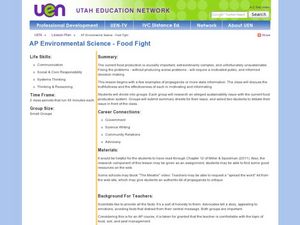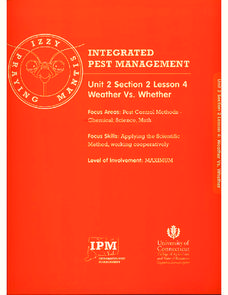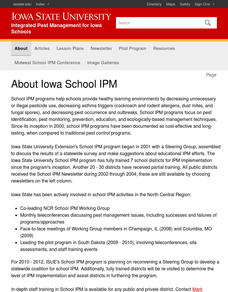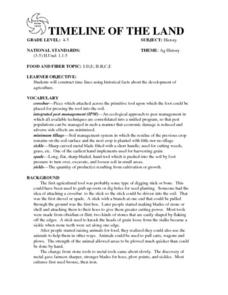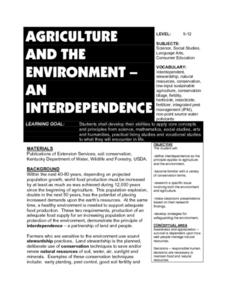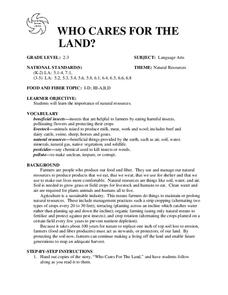Curated OER
Organic Farming / Agriculture
Want an organic farming resource packed with experiments, background information, science fair projects, and topics of interest for further research? Here it is. Young environmental scientists can explore concepts involved in organic...
Michigan State University
Friend or Foe?
What one person thinks is a pest may not be a pest to someone else. Here, scholars examine the characteristics of living things and pests through grand conversation and a variety of activities. Class members play a game of pest or not a...
Curated OER
Mouthpart Madness
Students explore the basic biology of a pest. They identify the four major kinds of insect mouthparts and explain how they work. Students examine the specific mouthparts and how they can limit food resources and in what environment an...
Curated OER
A Yen for Maximum Residue Limits in Food
Future public health officials or agriculturists read an article and answer questions concerning the Japanese regulations for pesticide exposure. They compare the maximum residue limit for two, 4-D of Japan with other countries. This is...
Curated OER
Sustainable Agriculture: Soils And Food Production
Ninth graders recognize differences in soil quality from one area to another. They describe the importance of organic matter in soil health and suggest ideas that help provide adequate food supplies for the world. The interview a person...
Curated OER
AP Environmental Science-Food Fight
The content in this lesson is of a controversial nature. Please review to make sure it is suitable for your class. A video, The Meatrix is shown to the class, and then they discuss the emotionally-charged language that it uses. They are...
Curated OER
What is a Pest?
Students investigate whether rabbits should be considered pests even though they make good pets. They extend this to determine what, when, and where other organisms are considered to be pests, and examine why the concept of a pest is a...
Curated OER
Forest Management ~ Diseases and Pests that Effect a Good Harvest Stand
The forestry presentation found here lists and describes a variety of tree diseases. A few unappetizing photos are included to show symptoms of some of these diseases, or the insects and fungi that cause them. If you have a class that is...
University of Connecticut
Weather Vs. Whether
Monarch butterfly populations have decreased by 90 percent over the past 20 years due to misuse and ineffectiveness of some pesticides. Given the challenge to increase pesticide safety and effectiveness, the class, through discussion,...
Curated OER
Web of Life
Learners construct a web of life. In this ecosystem activity students are introduced to ecosystems and life cycles. Insects are the main focus.
Curated OER
Field Crops in the Agro-ecosystem
Ninth graders explore how to apply ecological analysis to cropping systems. In this agro-ecosystem instructional activity students study management practices including soil and fertility.
American Museum of Natural History
Bio-Benefits
Kick-start a discussion of the importance of biodiversity with a colorful resource that touts the benefits of maintaining healthy ecosystems. The images stress the interdependence of all the elements of an ecosystem.
Curated OER
PESTICIDES AS CHEMICAL TOOLS IN IPM
Tenth graders explore the importance of pesticides as chemical tools. The chemistry of a pesticide is important for understanding the composition of the product, the classification of pesticides according to their use and the...
Curated OER
What's Hiding in Your Home Cabinets?
Pupils analyze a variety of products found in their own homes to determine their toxic content. They identify words such as caution, warning or danger and relate them to their relative toxicity levels.
Curated OER
TIMELINE OF THE LAND
Learners construct time lines using historical facts about the development of agriculture. Students research specific dates and events and report their findings to the class. Learners tape or glue the sections together sequentially in a...
Curated OER
Horticulture Crops in the agro-ecosystem
Ninth graders apply ecological analysis to fruit and vegetable production systems. In this horticulture lesson students learn about different management practices.
Curated OER
The Sweet Connection
Fifth graders use maps to find what crops are dominant in areas where honeybees are raised and discuss possible correlations.
Curated OER
The Invasion of the Medfly
Students examine the invasion of the fruit fly in California. In groups, they observe and record the fruit fly's lifecycle and how they affect humans in society. They also discuss the history and geography of the fly and the different...
Curated OER
Web of Life - Ecosystem
Third graders play the roles of various organisms in an ecosystem (focusing on insects) and pass yarn or string around to other organisms from largest animals to the smallest. The end product is a web which shows how all of these animals...
Curated OER
Agriculture and the Environment
Young scholars investigate the interdependence of agriculture and the environment. They research areas of interdependence and provide examples of situations where farmers are practicing conservation in the local area. Their findings are...
Curated OER
Sustainable Agriculture
Students explore examples of methods utilized in traditional agricultural practices. They state examples ot methods used in sustainable agricultural practices. They draw conclusions from information presented to them.
Curated OER
Little Me in a Big World: Ants
First graders predict, observe and record strategies to overcome them using discussions, role play, and charts. Over a three or four day period, they examine obstacles that humans and insects encounter.
Curated OER
What's Organic?
Young scholars discuss background information presented by the teacher and read dictionary definitions for the words "organic" and "synthetic." In this gardengin lesson, students complete a worksheet on the material. Young scholars grow...
Curated OER
WHO CARES FOR THE LAND?
Students explore the importance of natural resources. They are given copies of the story, "Who Cares For The Land," and students follow
along as the teacher reads it. Students identify the key points in the story. (Soil, water and air...







